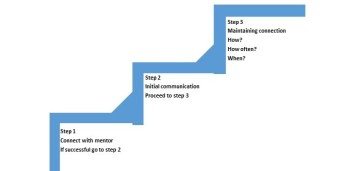In my last two posts I discussed the benefits of networking and I highlighted the challenges that might hinder attempts to network. The main aim for networking in both posts seeks to develop a working relationship with a mentor. Early on in this post, I will like to reiterate that though my current topic of interest is being discussed mainly in the academic networking context, it could be seen as relatable to other work/life contexts.
After the initial connection with someone, there is a need for further communication. I see this as a crucial next step to progress the initial contact. As shown in the figure below, I also believe there is a third step to foster a continuing beneficial network. This third stage is not so straightforward and I have not seen it addressed in my readings and observations so far. This does not mean that others have not thought about this (after all there is no new thing under the sun). I think it is good to articulate my views in this post to encourage discussions and sharing ideas. So, my big question in this post: are there guides out there on how to keep up with those you have connected with?

There are manuals for ‘dummies’ in so many fields of study or areas of interest, e.g. philosophy for dummies, statistics for dummies e.t.c. There is probably networking (social networking) for dummies – or perhaps there should be! Networking in the first instance is one thing, how do you then get on after the connection has been made? I will raise three scenarios which I find to be a bit of a conundrum. First, are there rules, for example, guiding how often you should contact a mentor say in a month or in a year or any given period of time? Second, and closely related to the first scenario, how do you maintain the channel of communication without overburdening your mentor with every minor observation or excuse at conversation? A third consideration is that you are not sure if you should be the one to initiate a new conversation.
My main point is that you want to keep the communication channel open but you do not want to unnecessarily take too much of your mentors’ time, and you certainly do not want to be seen as discussing banalities when you should be having an intelligent conversation. I think one sometimes want so much to make a good impression waiting for the right opportunity, then you realise that so much time has passed without any contact and your feel conflicted about writing that opening line in an email to re-enter your mentors’ space and their time – after a certain space of time. At that stage, it is very easy to give up. And I believe that is a loss more to the upcoming mentee than the mentor who probably has a well-established career. Perhaps that also suggests that the mentee ought to work proactively towards maintaining the relationship as much as possible.
If one accept that for the most part the onus for continuing a mentor/mentee relationship lies with the mentee, this brings us back to my original point; so how do you go about it in a respectful, professional and acceptable manner?
For now, to deal with this conundrum, I just try my best to be authentic in my communication. Most times I try to reach out again to my mentors when I feel that I have left the communication trail ‘cold’. Most times also, this has worked out positively. But I do sometimes wish there is a prescriptive manual out there as a guide to know how often you should contact your mentor. But there isn’t one. Perhaps my wishful thinking could be likened to wanting to have a manual for living, like how to love and when to start loving – lol! Things don’t work out like that. Life is not that straightforward. So I think I will likely continue to worry about making the right impression on my mentors and hope they understand when I do not communicate as often as I perceive I should. In my case at least, it is sometimes not for not knowing what to say but not knowing when to say it!
This post is as much about having a conversation as it is about this very human element of maintaining a relationship with a mentor. Your thoughts, as always, would be welcomed!


Great piece …….this is always the hardest part of networking.
LikeLike
Thanks for your comment. I agree with you!
LikeLike